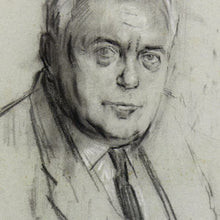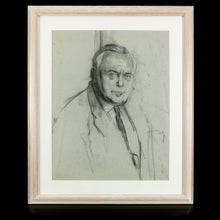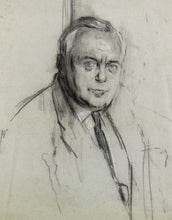Prime Minister Sir Harold Wilson, KG - Ruskin Spear, 1974
- Regular price
- £1,950
- Sale price
- £1,950
- Regular price
-
- Unit price
- /per
Adding product to your cart
Overall: 54cm (21.2in) x 64.7cm (25.5in)
Charcoal on paper. A half length study of Sir Harold Wilson for the portraits at Jesus College, Oxford and at University College, Oxford. Studio label of Ruskin Spear verso. Sheet: 49cm (19.3in) x 38cm (15in).
An MP at twenty-nine, and at forty-eight Britain's youngest Prime Minister since Pitt, Harold Wilson led a series of cabinets through the 1960s and 1970s which confirmed Britain's commitment to a welfare state. A gifted speaker and a skilful politician, he was famously portrayed by Spear wreathed in pipe smoke, belying his love of cigars.
Read more
Rt. Hon. Sir Harold Wilson, Baron Wilson of Rievaulx, KG, OBE, PC, FRS, FSS, (1916-95), a Yorkshireman and the only leader of the Labour Party so far to have led more than one Labour government. Wilson was elected to Parliament as part of the landslide Labour majority of 1945, having previously been an economics lecturer at New College, Oxford at the young age of 21 in 1937. On the outbreak of the Second World War, he volunteered for military service but was classed as a specialist and moved into the civil service instead. For much of this time, he was a research assistant to William Beveridge, the Master of University College, working on the issues of unemployment and the trade cycle. Wilson later became a statistician and economist for the coal industry. He was Director of Economics and Statistics at the Ministry of Fuel and Power in 1943-44 and was made an OBE for his services
He served in Attlee's radical government, becoming leader of Labour in 1963, and taking the party to electoral victory in 1964. He stayed in office until 1970, and then came back in the 1974 general election. But, as his government tried to deal with 25% inflation, he suddenly retired in 1976. Wilson's electoral successes were not enough to win him a reputation as a great prime minister, as he failed to reverse Britain's postwar economic decline or improve the nation's response to post-colonial crises in Zimbabwe and Northern Ireland - and left a legacy of discontent on the left of his party. He was an early proponent of politics as popular culture, awarding MBEs to the Beatles and appearing on the Morecambe and Wise Show.
Ruskin Spear, CBE, RA, (1911-1990) was the son of a coach builder and was born in Hammersmith, west London. Crippled by childhood polio, he attended a local school ‘for physically defective children’ and won a scholarship to Hammersmith Art School and later to the the Royal College of Art. He was heavily influenced by Walter Sickert and became known for street views of Hammersmith and as a portraitist. During the Second World War he participated in Kenneth Clark’s ‘Recording Britain’ scheme and played jazz piano in various in various clubs and bars. In 1948 he began a 30 year stint as a tutor at the RCA but stuck to his own urban realist style despite seeing the 1960s generation of pop artists, including David Hockney, come and go.






